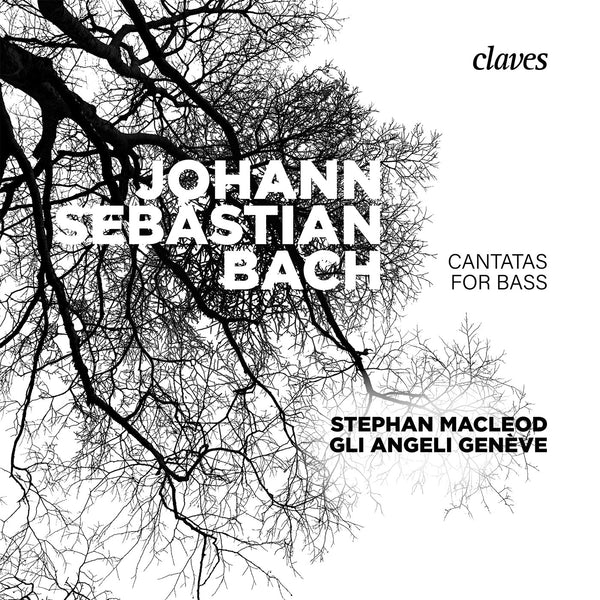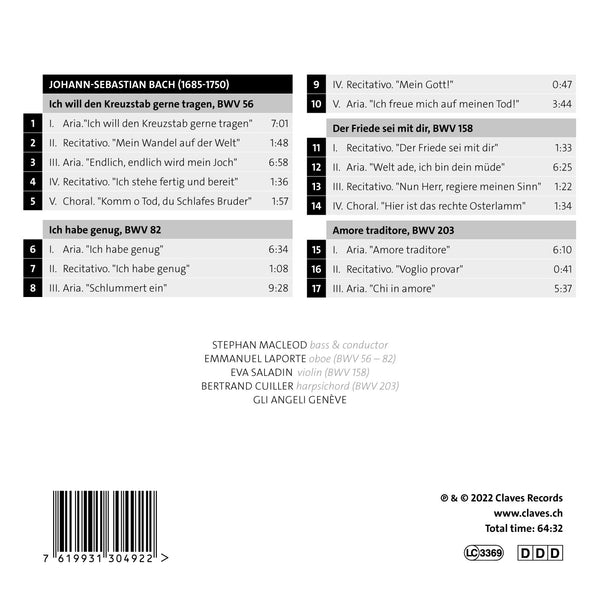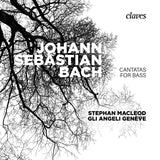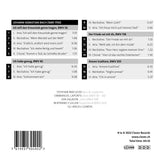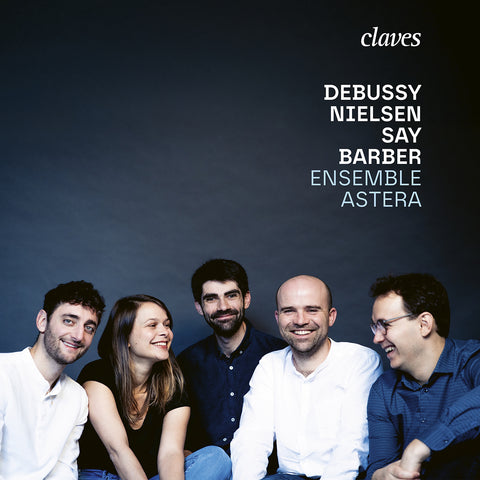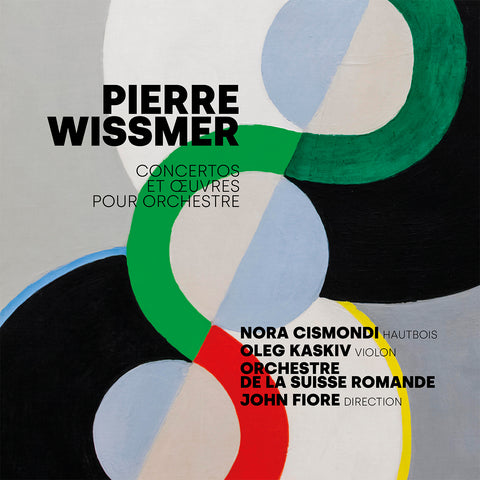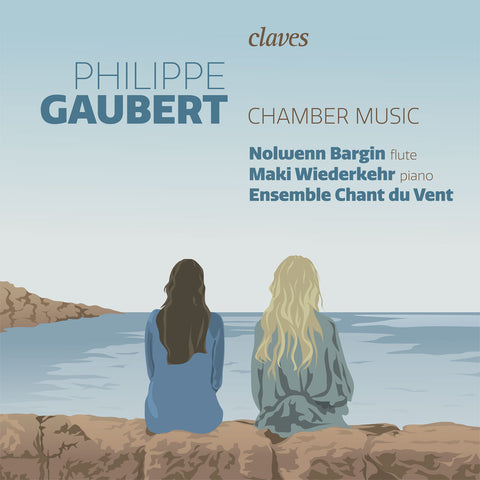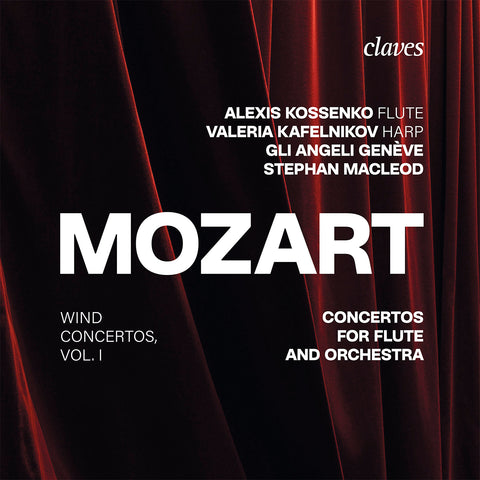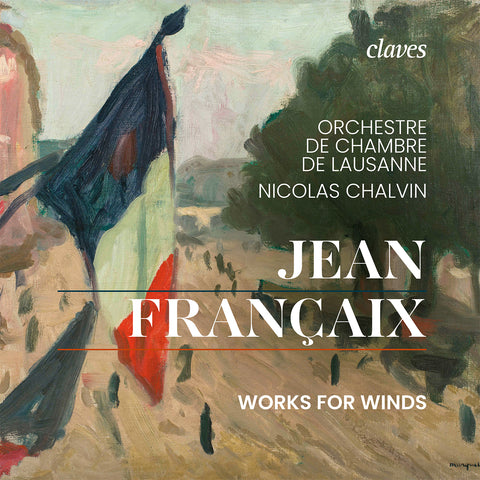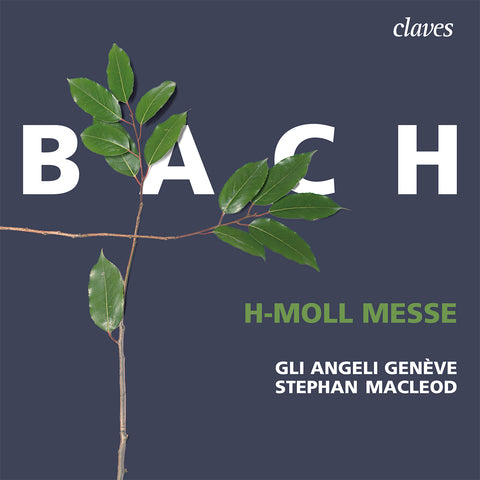(2022) J.S. Bach: Cantatas for Bass BWV 56-82-158-203
Category(ies): Oper vocal Repertoire
Instrument(s): Harpischord Oboe Violin
Vocal(s): Bass (vocal)
Main Composer: Johann Sebastian Bach
Ensemble: Gli Angeli Genève
Conductor: Stephan MacLeod
CD set: 1
Catalog N°:
CD 3049
Release: 29.04.2022
EAN/UPC: 7619931304922
This album is now on repressing. Pre-order it at a special price now.
CHF 18.50
This album is no longer available on CD.
This album has not been released yet. Pre-order it from now.
CHF 18.50
This album is no longer available on CD.
CHF 18.50
VAT included for Switzerland & UE
Free shipping
This album is no longer available on CD.
VAT included for Switzerland & UE
Free shipping
This album is now on repressing. Pre-order it at a special price now.
CHF 18.50
This album is no longer available on CD.
This album has not been released yet.
Pre-order it at a special price now.
CHF 18.50
This album is no longer available on CD.
CHF 18.50
This album is no longer available on CD.
J.S. BACH: CANTATAS FOR BASS BWV 56-82-158-203
THE BASS AND SIMEON
There are still many mysteries surrounding Johann Sebastian Bach’s personality. Yet, as new and exciting biographies appear, telling us more and more about the composer, we keep wondering what kind of a man he was in everyday life. Maybe because the very idea of the existence of such a genius is almost disturbing, and never ceases to amaze. However, that Bach was frequently called upon by instrument makers, and not only by organ builders, to listen to, gauge, and probably help tune musical instruments is no secret. He is thus closely related to the oboe family’s history since both the oboe da caccia and the oboe d’amore first appeared in Leipzig while Bach was working there. Moreover, he is the only composer to have offered music (the Passions and numerous cantatas) to the former and its warm, tender tone.
Bach showed unique know-how in the understanding and the use of the instruments’ potential, never limiting any of them to one or two modes of expression when composing, but making the most of all their technical, sonic and expressive facets. He also treated each voice tessitura with equal exactness. Whereas the bass voice is also that of Christ in the Passions, or the evocation of the voice of God in certain cantatas, Bach did not confine it to this sole use. From one Sunday to the next, the bass voice could just as well embody a thundering preacher as a desperate Christian.
Therefore, it is striking that three of Bach’s four surviving cantatas for bass solo present such similarities regarding the theme of their librettos and their chronological proximity. BWV 56 and 82 were composed in 1726 and 1727 in Leipzig. BWV 158 is an older piece from which only fragments have survived. It was revived in Leipzig, probably as early as 1728, according to Joshua Rifkin (or between 1728 and 1731, according to other historians and biographers). If Rifkin says right, we are faced with a proper cycle, a yearly and regular punctuation in the music produced for the liturgical calendar that Bach presented each Sunday. In those years, the composer seems to have regularly privileged the solo bass voice to evoke the relieved and longed-for passage from life to death, most often summoning Simeon, the one who tells us that now, finally, is the moment to die.
This thematic unity will come as no surprise to musicians familiar with Bach’s cantatas, in which the acceptance and hope of death is one of the most recurrent themes, if not the main one, of the entire corpus. But, in the present case, we were nevertheless surprised by its intensity. Bach does the same with human voices as with musical instruments: he seizes death, our fear of death and its expectation, to depict it in all forms and manners, at all levels of expressive intensity and with all possible musical means. His art opens up an infinite prism of perceptions of the world, and his genius definitely makes life more acceptable.
Stephan MacLeod
***
BACH: BASS CANTATAS BWV 56, 82, 158, 203
The three cantatas BWV 56, 82 and 158 deal with death. Not the frightening death against which the helpless individual rebels, but the desired death that both redeems from sin and liberates from the pains of life. “Come, O death, sister of sleep, come and take me away”: the cantata BWV 56, with one of the most beautiful chorales ever composed by Bach, ends with these words as if the music was standing on the fringe of wakefulness and sleep, of life and death, in that transition moment when borders become blurred. All of these cantatas are entrusted to the bass, the voice of a mature man, and in the Passions, the voice of Christ. This leads us to believe that Bach’s personal position is expressed here more directly than elsewhere (according to his son Carl Philipp Emmanuel, he had a “penetrating and large voice”). Incidentally, the term cantata was only assigned to such works for solo voice in those days.
The cantata BWV 56, Ich will den Kreuzstab gerne tragen (I would gladly carry the cross), was first performed in Leipzig on 27 October 1726. It has an Italian title: Cantata a Voce Sola e Stromenti (Bach composed several cantatas for solo voices during this period). The piece belongs to the musician›s third year of musical production since his appointment as Cantor. Unfortunately, only part of this output has come down to us.
The whole cantata evokes the journey from one world to the other through the images of the cross in the opening aria and navigation in the first recitative. The following aria makes reference to an eagle to suggest the journey. Finally, the last recitative expresses the yearning to reach the destination. Through these images, the burdened body re-enacts the sacrifice of Christ: death is rebirth. The torments and sorrows (Plagen, Kummer), the affliction and misery (Betrübnis, Not), the yoke and the cross (Joch, Kreuz) are metamorphosed by faith and become bliss and rest (Seligkeit, Ruhe). The music expresses this carnal and spiritual reality through harmonic tensions that arise from the relationship between dissonance and consonance. [..]
Philippe Albèra
Read more in the booklet
***
STEPHAN MACLEOD
Geneva-born Stephan MacLeod is a singer and conductor. He now conducts between 40 and 50 concerts a year worldwide, including an increasing number of appearances as guest conductor with “modern” orchestras. He also happily pursues his career as a singer and is a vocal teacher at the Haute Ecole de Musique de Lausanne (HEMU).
After studying the violin and the piano, Stephan MacLeod began singing. He first received his vocal training at the Geneva Conservatory, then with Kurt Moll at the Musikhochschule in Cologne and finally with Gary Magby at the Haute Ecole de Musique in Lausanne. His career began while he was still a student in Germany thanks to a fruitful collaboration with Reinhard Goebel and Musica Antiqua Köln. That experience led him to the oratorio repertoire. Stephan MacLeod has since been singing regularly in the world’s most prominent venues under conductors such as Philippe Herreweghe, Jordi Savall, Frieder Bernius, Franz Brüggen, Masaaki Suzuki, Michel Corboz, Gustav Leonhardt, Christophe Coin, Konrad Junghänel, Hans-Christoph Rademann, Sigiswald Kuijken, Vaclav Luks, Philippe Pierlot, Helmut Rilling, Rudolf Lutz, Paul Van Nevel and Jos Van Immerseel, as well as Daniel Harding and Jesus Lopez Cobos.
As a Lied and melody lover, Stephan MacLeod gives numerous recitals. He has also appeared on opera stages, notably at La Monnaie in Brussel, La Fenice in Venice, and in opera houses in Geneva, Toulouse, Nîmes, Bordeaux, Cologne, Potsdam, Freiburg, Gerona, etc. Alongside his singing career, he has also been conducting regularly since 2005 and is the founder of Gli Angeli Genève, an ensemble that has gained significant international recognition in recent years.
Since 2013, Stephan MacLeod is a vocal teacher at the Haute Ecole de Musique de Lausanne. He divides his time between family, teaching, singing commitments, his ensemble and conducting – particularly Bach’s music. His discography includes over 100 CDs, many of which have been awarded.
***
GLI ANGELI GENÈVE
Gli Angeli Genève was founded in 2005 by Stephan MacLeod. This ensemble of variable size plays on period instruments (or copies thereof) and comprises musicians who pursue a career in baroque music but are not active in this field only: they do not solely play early music. Their eclecticism guarantees the vitality of their enthusiasm. It is also a driving force behind their curiosity.
From the very beginning of its musical adventure – solely focused for several years on the concert performance of the complete Bach Cantatas, with three concerts per season in Geneva – Gli Angeli Genève has been a meeting place for some of the most famous singers and instrumentalists on the international Baroque scene and young graduates of the Basel, Lyon, Lausanne and Geneva music schools.
The ensemble’s first two recordings, released in 2009 and 2010, won critical acclaim and international recognition. Gli Angeli Genève now gives over ten concerts each season in Geneva. These include the complete Bach Cantatas and a series of annual concerts at the Victoria Hall, as well as performances within the ensemble’s own Haydn-Mozart Festival and a season of chamber music concerts from September 2022 onwards. Gli Angeli is also much-demanded in Switzerland and abroad for performances of music by Bach, Tallis, Josquin, Schein, Schütz, Johann Christoph Bach, Weckmann, Buxtehude, Rosenmüller, Haydn, Mozart and others. In recent seasons, Gli Angeli Genève has been in residence at the Utrecht Festival and the Thüringer Bachwochen and has also given concerts in Basel, Zurich, Lucerne, Barcelona, Nürnberg, Bremen, Stuttgart, Brussels, Milan, Wroclaw, Paris, Ottawa, Vancouver and The Hague. It is a regular guest at the Saintes and Utrecht festivals, the Musikfest in Bremen or the Bach Festival in Vancouver. The ensemble made its debut at the Grand Théâtre de Genève in 2017 and the KKL Luzern in 2019.
Gli Angeli Genève’s first recording for Claves, Sacred Music of the 17th Century in Wroclaw, won the 2019 ICMA Award for the best recording of the year of baroque vocal music. In addition, Johann Sebastian Bach’s St. Matthew Passion received enthusiastic acclaim from audiences and critics, both in Switzerland and worldwide. Gli Angeli Genève's recordings also include Bach's Mass in B minor, nominated in 2022 for an ICMA Award, and Antoine Reicha’s rarely performed Symphonies Concertantes, with soloists Christophe Coin, Davit Melkonyan, Chouchane Siranossian and Alexis Kossenko.
(Translation: Michelle Bulloch - Musitext)
***
Gli Angeli Genève
Soloists
Emmanuel Laporte, hautbois (BWV 56 – 82)
Eva Saladin, violon (BWV 158)
Bertrand Cuiller, clavecin (BWV 203)
Instrumentists
Emmanuel Laporte, Seung-Kyung Lee-Blondel, oboe
Marcel Ponseele, hunting oboe
Tomasz Wesołowski, bassoon
Eva Saladin, Adrien Carré, Yoko Kawakubo, violin 1
Nadia Rigolet, Coline Ormond, Xavier Sichel, violin 2
Sonoko Asabuki, Martine Schnorhk, violas
Hager Hanana, Oleguer Aymami, cellos
Michaël Chanu, double bass
Francis Jacob, organ
Bertrand Cuiller, harpsichord
Singers
Aleksandra Lewandowska, Chiyuki Okamura, sopranos
Christelle Monney, Charles Sudan, altos
Thomas Hobbs, Augustin Laudet, tenors
Frederik Sjollema, bass
Stephan MacLeod, bass & direction
REVIEWS
« [..] Stephan MacLeod und sein stilistisch überaus kompetentes Barockensemble präsentieren die Werke makellos homogen, durchhörbar in allen Stimmen. Allerdings bleibt MacLeod den kontrastierenden Affekten mit seiner geradlinigen Gestaltung einiges schuldig. Eine Überraschung bringt zum Schluss die italienische Kantate: Der Cembalist Bertrand Cuiller erfüllt die bizarre Generalbassstimme mit Fantasie und Geschick, entfesselt ein virtuoses Feuerwerk und beschließt die Schlussritornelle beider Arien mit launigen Varianten. » - Jürgen Hinz, November 2022
« [..] Ses disques précédents l’ont montré, Stephan MacLeod est homme d’intériorité plus que de drame. Sans surprise, sa BWV 82 se déploie comme une ample méditation, chantée avec une délicatesse vespérale dont participe la pulsation discrète de l’orchestre sur lequel plane, dans l’aria initiale, la plainte touchante du hautbois d’Emmanuel Laporte. [..] » - Jean-Christophe Pucek, octobre 2022
“This is a beautifully crafted CD. After many years of singing for others, Stephan Macleod, the Swiss bass-baritone, has put together his own group of singers and players under the name of Gli Angeli Genève, and they perform splendidly under his direction. [..]” - David Stancliffe, May 2023
« Der Schweizer Stephan MacLeod, Jahrgang 1971, ist ein sehr breit aufgestellter Musiker: Mit Klavier und Violine hat er sein Studium begonnen, ist dann zum Gesang und spater zusatzlich noch zum Dirigieren gewechselt. 2005 hat er in Genf das Ensemble Gli Angeli Geneve gegrundet, und bei dieser Aufnahme Bach‘scher Basskantaten erleben wir ihn in Doppelfunktion am Pult wie als singenden Solisten. MacLeod hat eine schlank gefuhrte, auch bei kurzeren Notenwerten und weiten Intervallsprungen intonatorisch sichere Stimme, die sich in der Mittellage eindeutig am wohlsten fuhlt; er singt stilistisch sicher und mit (bis auf kleinere Undeutlichkeiten) deutlicher Artikulation. [..] » - Susanne Benda-Hoffmann, August 2022
“This is not the first time Stephan MacLeod has recorded Ich habe genug, nor even the second. He sang it in 2006 on a disc of Bach cantatas with Montreal Baroque under Eric Milnes (ATMA Classique, 6/07), and subsequently included it on a disc he made – as here with his own group, Gli Angeli Genève – of sacred cantatas by Bach, Buxtehude and others (Sony, 11/08). The difference, of course, is that this time it is set in the context of Bach’s other two church cantatas for solo bass and orchestra, and thus the attention is drawn more firmly to MacLeod’s own voice. [..]” - Lindsay Kemp, October 2022
« [..] Stephan MacLeod ist aus vielen Kontexten als hervorragender Bach-Bassist bekannt und vertraut, hat zudem mit seinem Ensemble Gli Angeli Genève in den vergangenen Jahren vernehmlich Akzente mit großen Projekten gesetzt, namentlich eine Matthäus-Passion mit Werner Güra als Evangelisten und eine h-Moll-Messe ragten heraus. Hier präsentiert er seine noble, komplette Stimme, mit ausgesprochen ausgeglichenen Registern von gleichmäßiger Qualität in allen Lagen. Ein gestaltendes Beben ist der Stimme zu eigen, immer kontrolliert und im Einsatz für eine luzide, emotional erwärmte Gestaltung. MacLeods Diktion ist natürlich und verständnissichernd; die Koloraturen sind elegant und technisch solide basiert. [..] » - Dr. Matthias Lange, Mai 2022
« On appréciera l’humilité avec laquelle aussi bien le soliste que les instrumentistes abordent ces oeuvres qui parlent de la mort sous l’angle de la rédemption et de la consolation. Trop souvent utilisées comme faire-valoir du chanteur, voire des instruments obligés, les cantates Ich habe genug ou Ich will den Kreuztab gerne tragen sont parcourues ici avec un soin de tous les instants. La virtuosité qu’elles requièrent de la part de ses exécutants n’est jamais prise en défaut mais possède l’insigne avantage de ne jamais émerger de manière ostentatoire. Une caresse de l’âme qui est avant toute chose celle de Bach. [..] » - Mai 2022
« Stephan MacLeod, au chant et à la direction de l’Ensemble Gli Angel Genève, s’attaque aux cantates pour basse de Johann Sebastian Bach. Difficile de faire mieux que cet enregistrement paru sous le label Claves. Le triptyque de Ich will den Kreuzstab gerne tragen (Je porterai volontiers ma croix) BWV 56, Ich habe genug (Je suis comblé) BWV 82 et Der Friede sei mit dir (Que la paix soit avec toi) BWV 158, axe naturellement le noyau thématique de cet ouvrage vers la contemplation mystique de la mort. [..] La belle couleur barytonale et l’expressivité harmonieuse de MacLeod sont simplement sublimes. Gli Angeli se présente ici sous sa direction avec un jeu très élégant et équilibré, pondéré plus que dramatique pour magnifier la thématique de ces cantates. » - Gianluigi Bocelli, mai 2022
“[..] This is the programme for the album Claves. The artists involved in the recording undoubtedly deserve a positive assessment for their deep understanding of the literary and musical content of the various compositions and their rendering of it through appropriate rhetorical and interpretative means. It is clear that we are dealing with a performance by the Geneva vocal-instrumental ensemble Gli Angeli, who are well acquainted with the Baroque repertoire and its stylish interpretation. [..]” - November 2022
« [..] Dans un registre plus fréquenté, toujours chez Claves, citons aussi le très beau disque Bach que signe Stephen Mcleod et Gli Angeli. Le chef de l’ensemble basé à Genève est, s’il faut le rappeler, une basse confirmée dont l’instrument vocal jouit d’une grande plénitude. Pas étonnant dès lors que cet éminent interprète des passions de Bach ait décidé de convoler avec les quatre cantates pour basse solo qui nous sont parvenues du cantor de Leipzig. On appréciera l’humilité avec laquelle aussi bien le soliste que les instrumentistes abordent ces oeuvres qui parlent de la mort sous l’angle de la rédemption et de la consolation. [..] Une caresse de l’âme qui est avant toute chose celle de Bach. » - Bernard Halter, juin 2022
(2022) J.S. Bach: Cantatas for Bass BWV 56-82-158-203 - CD 3049
THE BASS AND SIMEON
There are still many mysteries surrounding Johann Sebastian Bach’s personality. Yet, as new and exciting biographies appear, telling us more and more about the composer, we keep wondering what kind of a man he was in everyday life. Maybe because the very idea of the existence of such a genius is almost disturbing, and never ceases to amaze. However, that Bach was frequently called upon by instrument makers, and not only by organ builders, to listen to, gauge, and probably help tune musical instruments is no secret. He is thus closely related to the oboe family’s history since both the oboe da caccia and the oboe d’amore first appeared in Leipzig while Bach was working there. Moreover, he is the only composer to have offered music (the Passions and numerous cantatas) to the former and its warm, tender tone.
Bach showed unique know-how in the understanding and the use of the instruments’ potential, never limiting any of them to one or two modes of expression when composing, but making the most of all their technical, sonic and expressive facets. He also treated each voice tessitura with equal exactness. Whereas the bass voice is also that of Christ in the Passions, or the evocation of the voice of God in certain cantatas, Bach did not confine it to this sole use. From one Sunday to the next, the bass voice could just as well embody a thundering preacher as a desperate Christian.
Therefore, it is striking that three of Bach’s four surviving cantatas for bass solo present such similarities regarding the theme of their librettos and their chronological proximity. BWV 56 and 82 were composed in 1726 and 1727 in Leipzig. BWV 158 is an older piece from which only fragments have survived. It was revived in Leipzig, probably as early as 1728, according to Joshua Rifkin (or between 1728 and 1731, according to other historians and biographers). If Rifkin says right, we are faced with a proper cycle, a yearly and regular punctuation in the music produced for the liturgical calendar that Bach presented each Sunday. In those years, the composer seems to have regularly privileged the solo bass voice to evoke the relieved and longed-for passage from life to death, most often summoning Simeon, the one who tells us that now, finally, is the moment to die.
This thematic unity will come as no surprise to musicians familiar with Bach’s cantatas, in which the acceptance and hope of death is one of the most recurrent themes, if not the main one, of the entire corpus. But, in the present case, we were nevertheless surprised by its intensity. Bach does the same with human voices as with musical instruments: he seizes death, our fear of death and its expectation, to depict it in all forms and manners, at all levels of expressive intensity and with all possible musical means. His art opens up an infinite prism of perceptions of the world, and his genius definitely makes life more acceptable.
Stephan MacLeod
***
BACH: BASS CANTATAS BWV 56, 82, 158, 203
The three cantatas BWV 56, 82 and 158 deal with death. Not the frightening death against which the helpless individual rebels, but the desired death that both redeems from sin and liberates from the pains of life. “Come, O death, sister of sleep, come and take me away”: the cantata BWV 56, with one of the most beautiful chorales ever composed by Bach, ends with these words as if the music was standing on the fringe of wakefulness and sleep, of life and death, in that transition moment when borders become blurred. All of these cantatas are entrusted to the bass, the voice of a mature man, and in the Passions, the voice of Christ. This leads us to believe that Bach’s personal position is expressed here more directly than elsewhere (according to his son Carl Philipp Emmanuel, he had a “penetrating and large voice”). Incidentally, the term cantata was only assigned to such works for solo voice in those days.
The cantata BWV 56, Ich will den Kreuzstab gerne tragen (I would gladly carry the cross), was first performed in Leipzig on 27 October 1726. It has an Italian title: Cantata a Voce Sola e Stromenti (Bach composed several cantatas for solo voices during this period). The piece belongs to the musician›s third year of musical production since his appointment as Cantor. Unfortunately, only part of this output has come down to us.
The whole cantata evokes the journey from one world to the other through the images of the cross in the opening aria and navigation in the first recitative. The following aria makes reference to an eagle to suggest the journey. Finally, the last recitative expresses the yearning to reach the destination. Through these images, the burdened body re-enacts the sacrifice of Christ: death is rebirth. The torments and sorrows (Plagen, Kummer), the affliction and misery (Betrübnis, Not), the yoke and the cross (Joch, Kreuz) are metamorphosed by faith and become bliss and rest (Seligkeit, Ruhe). The music expresses this carnal and spiritual reality through harmonic tensions that arise from the relationship between dissonance and consonance. [..]
Philippe Albèra
Read more in the booklet
***
STEPHAN MACLEOD
Geneva-born Stephan MacLeod is a singer and conductor. He now conducts between 40 and 50 concerts a year worldwide, including an increasing number of appearances as guest conductor with “modern” orchestras. He also happily pursues his career as a singer and is a vocal teacher at the Haute Ecole de Musique de Lausanne (HEMU).
After studying the violin and the piano, Stephan MacLeod began singing. He first received his vocal training at the Geneva Conservatory, then with Kurt Moll at the Musikhochschule in Cologne and finally with Gary Magby at the Haute Ecole de Musique in Lausanne. His career began while he was still a student in Germany thanks to a fruitful collaboration with Reinhard Goebel and Musica Antiqua Köln. That experience led him to the oratorio repertoire. Stephan MacLeod has since been singing regularly in the world’s most prominent venues under conductors such as Philippe Herreweghe, Jordi Savall, Frieder Bernius, Franz Brüggen, Masaaki Suzuki, Michel Corboz, Gustav Leonhardt, Christophe Coin, Konrad Junghänel, Hans-Christoph Rademann, Sigiswald Kuijken, Vaclav Luks, Philippe Pierlot, Helmut Rilling, Rudolf Lutz, Paul Van Nevel and Jos Van Immerseel, as well as Daniel Harding and Jesus Lopez Cobos.
As a Lied and melody lover, Stephan MacLeod gives numerous recitals. He has also appeared on opera stages, notably at La Monnaie in Brussel, La Fenice in Venice, and in opera houses in Geneva, Toulouse, Nîmes, Bordeaux, Cologne, Potsdam, Freiburg, Gerona, etc. Alongside his singing career, he has also been conducting regularly since 2005 and is the founder of Gli Angeli Genève, an ensemble that has gained significant international recognition in recent years.
Since 2013, Stephan MacLeod is a vocal teacher at the Haute Ecole de Musique de Lausanne. He divides his time between family, teaching, singing commitments, his ensemble and conducting – particularly Bach’s music. His discography includes over 100 CDs, many of which have been awarded.
***
GLI ANGELI GENÈVE
Gli Angeli Genève was founded in 2005 by Stephan MacLeod. This ensemble of variable size plays on period instruments (or copies thereof) and comprises musicians who pursue a career in baroque music but are not active in this field only: they do not solely play early music. Their eclecticism guarantees the vitality of their enthusiasm. It is also a driving force behind their curiosity.
From the very beginning of its musical adventure – solely focused for several years on the concert performance of the complete Bach Cantatas, with three concerts per season in Geneva – Gli Angeli Genève has been a meeting place for some of the most famous singers and instrumentalists on the international Baroque scene and young graduates of the Basel, Lyon, Lausanne and Geneva music schools.
The ensemble’s first two recordings, released in 2009 and 2010, won critical acclaim and international recognition. Gli Angeli Genève now gives over ten concerts each season in Geneva. These include the complete Bach Cantatas and a series of annual concerts at the Victoria Hall, as well as performances within the ensemble’s own Haydn-Mozart Festival and a season of chamber music concerts from September 2022 onwards. Gli Angeli is also much-demanded in Switzerland and abroad for performances of music by Bach, Tallis, Josquin, Schein, Schütz, Johann Christoph Bach, Weckmann, Buxtehude, Rosenmüller, Haydn, Mozart and others. In recent seasons, Gli Angeli Genève has been in residence at the Utrecht Festival and the Thüringer Bachwochen and has also given concerts in Basel, Zurich, Lucerne, Barcelona, Nürnberg, Bremen, Stuttgart, Brussels, Milan, Wroclaw, Paris, Ottawa, Vancouver and The Hague. It is a regular guest at the Saintes and Utrecht festivals, the Musikfest in Bremen or the Bach Festival in Vancouver. The ensemble made its debut at the Grand Théâtre de Genève in 2017 and the KKL Luzern in 2019.
Gli Angeli Genève’s first recording for Claves, Sacred Music of the 17th Century in Wroclaw, won the 2019 ICMA Award for the best recording of the year of baroque vocal music. In addition, Johann Sebastian Bach’s St. Matthew Passion received enthusiastic acclaim from audiences and critics, both in Switzerland and worldwide. Gli Angeli Genève's recordings also include Bach's Mass in B minor, nominated in 2022 for an ICMA Award, and Antoine Reicha’s rarely performed Symphonies Concertantes, with soloists Christophe Coin, Davit Melkonyan, Chouchane Siranossian and Alexis Kossenko.
(Translation: Michelle Bulloch - Musitext)
***
Gli Angeli Genève
Soloists
Emmanuel Laporte, hautbois (BWV 56 – 82)
Eva Saladin, violon (BWV 158)
Bertrand Cuiller, clavecin (BWV 203)
Instrumentists
Emmanuel Laporte, Seung-Kyung Lee-Blondel, oboe
Marcel Ponseele, hunting oboe
Tomasz Wesołowski, bassoon
Eva Saladin, Adrien Carré, Yoko Kawakubo, violin 1
Nadia Rigolet, Coline Ormond, Xavier Sichel, violin 2
Sonoko Asabuki, Martine Schnorhk, violas
Hager Hanana, Oleguer Aymami, cellos
Michaël Chanu, double bass
Francis Jacob, organ
Bertrand Cuiller, harpsichord
Singers
Aleksandra Lewandowska, Chiyuki Okamura, sopranos
Christelle Monney, Charles Sudan, altos
Thomas Hobbs, Augustin Laudet, tenors
Frederik Sjollema, bass
Stephan MacLeod, bass & direction
REVIEWS
« [..] Stephan MacLeod und sein stilistisch überaus kompetentes Barockensemble präsentieren die Werke makellos homogen, durchhörbar in allen Stimmen. Allerdings bleibt MacLeod den kontrastierenden Affekten mit seiner geradlinigen Gestaltung einiges schuldig. Eine Überraschung bringt zum Schluss die italienische Kantate: Der Cembalist Bertrand Cuiller erfüllt die bizarre Generalbassstimme mit Fantasie und Geschick, entfesselt ein virtuoses Feuerwerk und beschließt die Schlussritornelle beider Arien mit launigen Varianten. » - Jürgen Hinz, November 2022
« [..] Ses disques précédents l’ont montré, Stephan MacLeod est homme d’intériorité plus que de drame. Sans surprise, sa BWV 82 se déploie comme une ample méditation, chantée avec une délicatesse vespérale dont participe la pulsation discrète de l’orchestre sur lequel plane, dans l’aria initiale, la plainte touchante du hautbois d’Emmanuel Laporte. [..] » - Jean-Christophe Pucek, octobre 2022
“This is a beautifully crafted CD. After many years of singing for others, Stephan Macleod, the Swiss bass-baritone, has put together his own group of singers and players under the name of Gli Angeli Genève, and they perform splendidly under his direction. [..]” - David Stancliffe, May 2023
« Der Schweizer Stephan MacLeod, Jahrgang 1971, ist ein sehr breit aufgestellter Musiker: Mit Klavier und Violine hat er sein Studium begonnen, ist dann zum Gesang und spater zusatzlich noch zum Dirigieren gewechselt. 2005 hat er in Genf das Ensemble Gli Angeli Geneve gegrundet, und bei dieser Aufnahme Bach‘scher Basskantaten erleben wir ihn in Doppelfunktion am Pult wie als singenden Solisten. MacLeod hat eine schlank gefuhrte, auch bei kurzeren Notenwerten und weiten Intervallsprungen intonatorisch sichere Stimme, die sich in der Mittellage eindeutig am wohlsten fuhlt; er singt stilistisch sicher und mit (bis auf kleinere Undeutlichkeiten) deutlicher Artikulation. [..] » - Susanne Benda-Hoffmann, August 2022
“This is not the first time Stephan MacLeod has recorded Ich habe genug, nor even the second. He sang it in 2006 on a disc of Bach cantatas with Montreal Baroque under Eric Milnes (ATMA Classique, 6/07), and subsequently included it on a disc he made – as here with his own group, Gli Angeli Genève – of sacred cantatas by Bach, Buxtehude and others (Sony, 11/08). The difference, of course, is that this time it is set in the context of Bach’s other two church cantatas for solo bass and orchestra, and thus the attention is drawn more firmly to MacLeod’s own voice. [..]” - Lindsay Kemp, October 2022
« [..] Stephan MacLeod ist aus vielen Kontexten als hervorragender Bach-Bassist bekannt und vertraut, hat zudem mit seinem Ensemble Gli Angeli Genève in den vergangenen Jahren vernehmlich Akzente mit großen Projekten gesetzt, namentlich eine Matthäus-Passion mit Werner Güra als Evangelisten und eine h-Moll-Messe ragten heraus. Hier präsentiert er seine noble, komplette Stimme, mit ausgesprochen ausgeglichenen Registern von gleichmäßiger Qualität in allen Lagen. Ein gestaltendes Beben ist der Stimme zu eigen, immer kontrolliert und im Einsatz für eine luzide, emotional erwärmte Gestaltung. MacLeods Diktion ist natürlich und verständnissichernd; die Koloraturen sind elegant und technisch solide basiert. [..] » - Dr. Matthias Lange, Mai 2022
« On appréciera l’humilité avec laquelle aussi bien le soliste que les instrumentistes abordent ces oeuvres qui parlent de la mort sous l’angle de la rédemption et de la consolation. Trop souvent utilisées comme faire-valoir du chanteur, voire des instruments obligés, les cantates Ich habe genug ou Ich will den Kreuztab gerne tragen sont parcourues ici avec un soin de tous les instants. La virtuosité qu’elles requièrent de la part de ses exécutants n’est jamais prise en défaut mais possède l’insigne avantage de ne jamais émerger de manière ostentatoire. Une caresse de l’âme qui est avant toute chose celle de Bach. [..] » - Mai 2022
« Stephan MacLeod, au chant et à la direction de l’Ensemble Gli Angel Genève, s’attaque aux cantates pour basse de Johann Sebastian Bach. Difficile de faire mieux que cet enregistrement paru sous le label Claves. Le triptyque de Ich will den Kreuzstab gerne tragen (Je porterai volontiers ma croix) BWV 56, Ich habe genug (Je suis comblé) BWV 82 et Der Friede sei mit dir (Que la paix soit avec toi) BWV 158, axe naturellement le noyau thématique de cet ouvrage vers la contemplation mystique de la mort. [..] La belle couleur barytonale et l’expressivité harmonieuse de MacLeod sont simplement sublimes. Gli Angeli se présente ici sous sa direction avec un jeu très élégant et équilibré, pondéré plus que dramatique pour magnifier la thématique de ces cantates. » - Gianluigi Bocelli, mai 2022
“[..] This is the programme for the album Claves. The artists involved in the recording undoubtedly deserve a positive assessment for their deep understanding of the literary and musical content of the various compositions and their rendering of it through appropriate rhetorical and interpretative means. It is clear that we are dealing with a performance by the Geneva vocal-instrumental ensemble Gli Angeli, who are well acquainted with the Baroque repertoire and its stylish interpretation. [..]” - November 2022
« [..] Dans un registre plus fréquenté, toujours chez Claves, citons aussi le très beau disque Bach que signe Stephen Mcleod et Gli Angeli. Le chef de l’ensemble basé à Genève est, s’il faut le rappeler, une basse confirmée dont l’instrument vocal jouit d’une grande plénitude. Pas étonnant dès lors que cet éminent interprète des passions de Bach ait décidé de convoler avec les quatre cantates pour basse solo qui nous sont parvenues du cantor de Leipzig. On appréciera l’humilité avec laquelle aussi bien le soliste que les instrumentistes abordent ces oeuvres qui parlent de la mort sous l’angle de la rédemption et de la consolation. [..] Une caresse de l’âme qui est avant toute chose celle de Bach. » - Bernard Halter, juin 2022
Return to the album | Read the booklet | Composer(s): Johann Sebastian Bach | Main Artist: Stephan MacLeod






